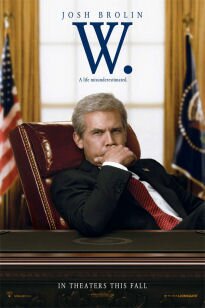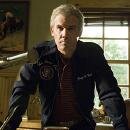
- W.
- OPENING: 10/17/2008
- STUDIO: Lionsgate
- TRAILER: Trailer
- ACCOMPLICES: Official Site
The Charge
Anyone can grow up to be President.
Opening Statement
“What are you cut out for? Partying, chasing tail, driving drunk…?! Who do you think you are, a Kennedy? You’re a Bush…act like one!” — Poppy Bush
Facts of the Case
In the late 1960s, U.S. Representative George H.W. Bush (James Cromwell, L.A. Confidential) is getting sick of bailing his son Junior (Josh Brolin, No Country For Old Men) out of embarrassing jams involving alcohol. The incidents would continue for at least ten years, until Junior meets Laura Welch (Elizabeth Banks, Zack And Miri Make A Porno), and falls in love. Determined to change for the better, he attempts to run for the House (and loses), then quits alcohol altogether when he allows God to come into his life. Eventually, he’s elected Governor of Texas and even U.S. President. Yet, he cannot shake off his one character flaw: constantly living in his father’s shadow, which drives his ambitions to ill-fated decisions as Commander-in-Chief.
The Evidence
Filmmaker Oliver Stone has returned to one of his major fortes. While his Vietnam trilogy has been complete for sometime now, he now successfully comes off a series of cinematic blunders (Alexander, World Trade Center) to bring us another biopic of a U.S. President; in this case, the one sitting in the White House right now! Many months ago, Stone announced his project W. would be released several weeks before the 2008 Presidential election. Almost immediately, speculation began and controversy erupted. Conservatives—fully aware of Stone’s liberal attitude and agenda—scorned him for daring to make a giant middle finger of a movie with only one purpose: to make Bush look like an ignorant fool. Indeed, early reports of a script leak somewhat confirmed their suspicions, suggesting this was written and produced by Lorne Michaels.

Alas, what we have here is Stone at his most relaxed, sober to the point of exhaustion. The director promised film-goers this would be a “fair, true portrait of the man,” and for the most part he lived up to his promise. W. is not a film full of radical conspiracy theories like JFK, but more in the vein of Nixon, which depicts a man given the privalege of power, soon discover he’s way in over his head, and ends up a tragic hero. If Bush is the film’s protagonist, then surely the antogonists are mentor Karl Rove and vice Dick Cheney, who groomed their little Texas oil slick to carry out their own agendas. Those who refuse to see W. will automatically assume that Stone can’t contain his indulgences to mock and slam his subject, and that’s kind of a shame.
If anything, Bush Jr. is given the benefit of the doubt in terms of positive ambition and good intentions. The problem was he was constantly hit on the head with a form of oedipus complex, always competing with his Daddy and consummating personal vendettas during his reign as President. Another driving force was jealousy of his brother Jeb, who followed in his father’s footsteps faithfully without side trips to the bar and knocking up girls in his spare time. The character arc is fascinating, in how we see a drunken loser redeem himself, getting married and laying off the bottle, then become the most powerful figure in the world within no time. Over the course of 2 hours and 11 minutes, we see Junior transform into W., and the results are provacative and incredibly entertaining. Credit must be given to Stanley Weiser (who previously wrote Stone’s Wall Street) for not only performing immaculate research, but also not making everything long-winded and drawn out, lingering on unnecessary details.

Not all of Stone’s films have been politically-motivated, but many of them respect history as something to be studied seriously. His masterpiece Born on The Fourth of July was raw in its depiction of America being deeply divided by a violent war which lost sight of its mission, instead doing nothing but claim people’s lives by the thousands. In W., he highlights decisions made behind closed doors which would result in the Iraq War, which has—in many ways—become a second Vietnam due to the Bush Administration’s ignoring of history. During these sequences, Bush himself acts mostly like an observer as the round table of familiar faces (including Colin Powell, Condoleeza Rice, and Donald Rumsfeld) debate over post-9/11 strategy, focusing on Iraq after the “brief exercise” in Afghanistan. Only Powell—a standout turn by Jeffrey Wright (Casino Royale)—is the one who seems to have a clear head, emphasizing that invading Iraq without cooperation from the United Nations would be international suicide. Considering the consequences, Stone makes another fine case of the importance of history, and nowhere is that more evident than when, towards the end, W. is asked what place he’ll have in history. His answer: we’ll all be dead! Yep, just like those thousands of American soldiers and Iraqi civilians.
Much has already been written on Stone’s casting choices. As with JFK and Nixon, we have a fine ensemble of actors, each of whom embody their real-life characters with eyebrow-raising, dead-on accuracy. Unfortunately, several of them only have a limited time to shine, and they include Ellen Burstyn (The Exorcist) as Barbara Bush, Scott Glenn (The Silence of the Lambs) as Rumsfeld, Toby Jones (The Mist) as Karl Rove, and John Ritter’s son Jason as Jeb Bush. Probably the one who has been criticized the most is Thandie Newton’s interpretation of Condoleezza Rice, which has been cited as having a decidedly SNL-vibe to it. While she’s off in terms of Rice’s voice, she does hold her own in many of scenes, particularly in the board meetings. Stacey Keach is a knockout in his two scenes as the religious Earle Hudd, who becomes Bush’s spiritual adviser.
While it may be premature to mention Oscar, there are several performances here which deserve to be considered for the acting categories. One is veteren James Cromwell, who’s excellent as the authoritative Bush Sr., and another is Dreyfuss’ brilliant, terrifying turn as the diabolical VP. Make no mistake, about it, however: Josh Brolin is so uncanny as the Prez it’s hard to think of another actor who could have pulled it off. The actor nails Bush’s voice, stuttering, and mannerisms with astonishing credibility, with a masterful make-up job to match. What’s also refreshing is that Brolin doesn’t reduce Bush to be a bad political joke, but gives him an equal amount of sympathy, humor and cowboy charm. This is, without a doubt, one of the best performances by an actor this year.
The Verdict







 8/10
8/10
1 comment so far ↓
Caught “W.” Monday afternoon at a mostly empty NYC movie theater. You won’t find a more staunch Bush Jr. critic than me but Stone applying the “Nixon” treatment to Dubya humanizes the man behind the stooge image with surprising results. The movie isn’t perfect (there should have been more scenes between the Bush siblings when they were older) and Lebowski from the Jury Room is right: there is a potentially a much better movie here than what’s been released theatrically. For $12 you’re basically getting the cliffnotes version of Bush’s life from his fraternity days up until just before the 2004 election. Tons of good stuff (the War Room back-and-forth between Bush’s cabinet members is fascinating) although only political junkies will be able to fill the gigantic gaps in “W.’s” many timeline/character leaps.
Brolin is OK as Dubya (way too many eating/drinking scenes though), Toby Keith is excellent as Karl Rove and Jeffrey Wright’s Powell goes toe-to-toe (both in real life and figuratively) with Dreyfuss’ condescending VP Cheney. Thandie Newton’s take on Condi Rice really is as weird as advertised (like a Tracey Ullman impersonation with layers of make-up) but James Cromwell is excellent as Bush Sr. even though he looks/sounds nothing like the man.
Leave a Comment